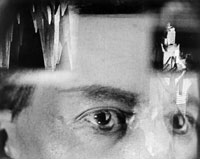
“La Coquille Et Le Clergyman” is a film par excellence of the French modern film director (“modern”, of course, is a relative term). That director was Damen Germaine Dulac, about whom this German Count commented recently on her film “L’Invitation Au Voyage”. Looking back on those recent reflections about Damen Dulac’s oeuvre, despite “L’Invitation Au Voyage” being a remarkable film, it wasn’t able to equal the experimental and transgressor spirit of “La Coquille Et Le Clergyman”, a film highly superior for its technical innovations, aesthetic virtues and risky themes.
“La Coquille Et Le Clergyman” was considered the first feminist film in history… although this Teutonic Count appreciates more misogynist touches in film (specifically in the clergyman character obsessed with a colonel’s wife). It is a film that was also considered the first Surrealist film ever made. But again this German Count must clarify the opinion of his ancestors. Although in style and form, “Le Coquille Et Le Clergyman” is certainly a film well recognized as Surrealist, it is not limited to be a film in where images are not connected and exposed with the only intention being to astonish the audience. Even though the Damen Dulac film maintains the Surrealist aesthetic outlook, it is a work in which it is possible to perceive a certain meaning and logic in the French director’s deluded story.
“La Coquille Et Le Clergyman” is an exceptional film for these reasons comments this German Count. It has plenty of visual suggestions, great scenery and technical experiments that pervade the film narrative with a dumbfounded and dreamful atmosphere. There are reflections about eternal obsessions and sexual desires to be perceived by the viewer. They are exposed with a peculiar sense of humour and irreverence, making the film valid today. What resonates especially with this German Count, the iconoclast, is the novel spirit of the film.
And now, if you'll allow me, I must temporarily take my leave because this German Count must recover his most Teutonic classic classicism after so much Frenchified modernity.
Herr Graf Ferdinand Von Galitzien
-/-
“La Coquille Et Le Clergyman” es el filme por excelencia de esa directora tan moderna incluso para sus tiempos que fue Damen Germaine Dulac, de la cual éste Conde germánico ha comentado recientemente “L’Invitation Au Voyage”.
Se mencionaban en esas reflexiones germánicas recientes sobre la obra de Damen Dulac, que a pesar de ser ciertamente una obra notable, “L’Invitation Au Voyage” no conseguía emular el carácter experimental y transgresor de “Le Coquille Et Le Clergyman”, un filme mucho más superior éste último en cuanto a innovación técnica y virtudes estéticas y arriesgadas propuestas cinematográficas.
Considerado como el primer filme feminista, aunque éste aristócrata teutón ha apreciado muchísimos más matices misóginos en el filme y más específicamente en el personaje del clergyman obsesionado éste con la esposa de un coronel, también fue destacado en su día como el primer filme surrealista, aunque en cierta forma también tiene éste Conde germánico que matizar ese calificativo de sus antepasados, pues aunque en estilo y forma, “Le Coquille Et Le Clergyman” es ciertamente un filme fácilmente reconocible como surrealista, no se limita a ser una obra en donde se exponen imagines sin conexión entre ambas con el único propósito de epatar al espectador, pues el filme de Damen Dulac aunque mantenga la forma estética surrealista, es un filme en donde se percibe una lógica y contenido en la historia alucinada que nos cuenta la directora francesa.
“La Coquille Et Le Clergyman” es un filme excepcional por esos motivos anteriormente mencionados por éste Conde germánico, lleno de sugerencias visuales, magníficos decorados y experimentos técnicos que impregnan la historia de una atmósfera alucinada, onírica, en donde se aprecian reflexiones sobre obsesiones y deseos sexuales eternos, tratados éstos con cierto humor y mucha irreverencia, manteniendo intacta hoy su vigencia, destacando en el filme su espíritu novedoso e iconoclasta.
Y ahora si me lo permiten les tengo que dejar momentáneamente, pues este Conde germánico tiene que recuperar su más clásico clasicismo teutón después de tanta modernidad afrancesada.
Herr Graf Ferdinand Von Galitzien

1 Kommentar:
In 1930, Paul Rotha wrote that La Coquille Et Le Clergyman " was banned from public exhibition by the British Board of Film Censors because it " is so cryptic as to be almost meaningless. If there is a meaning it is doubtless objectionable". Rotha comments " that to confess ignorance of the significance of a film and then to reveal that it is "doubtless objectionable: " reveals a standard of criticism that is truly Gilbertian"
Kommentar veröffentlichen